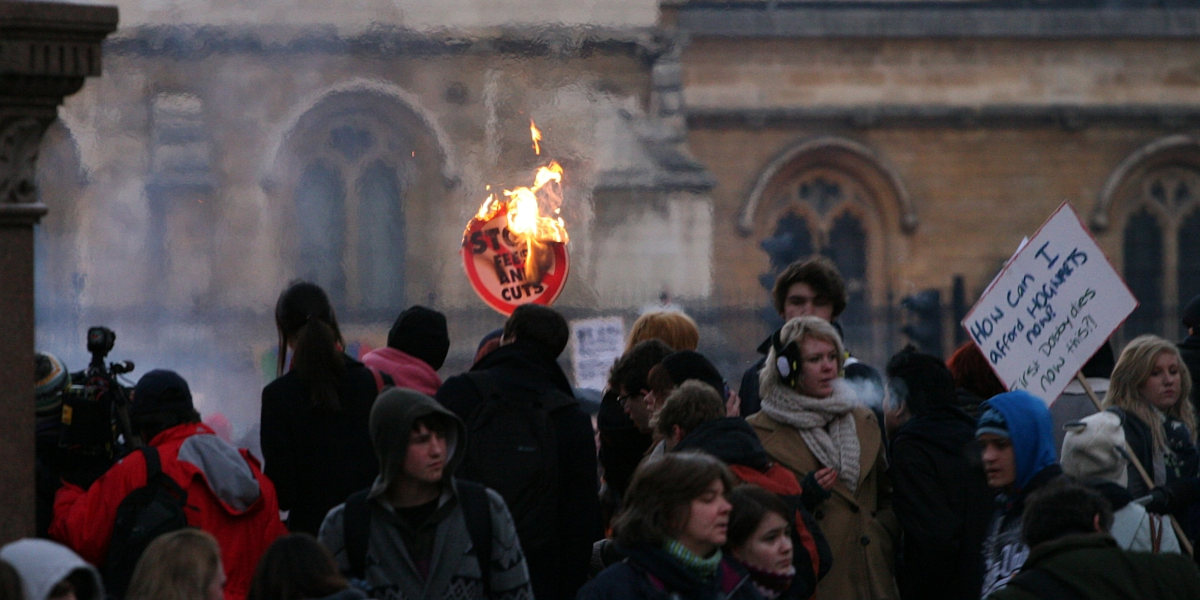Six PM and all seems well, until half way down Victoria Street when the crowds vanish and the few shoppers left start heading one way: away. Then, you emerge into an almost empty side street, necklaced by a line of police. Beyond them, facing the other way, surrounding Parliament Square, rows upon rows of police, and behind them, all exits blocked, thousands of people, invisible over the massed police helmets. Periodically a plume of smoke rises, sometimes an almost inaudible chant: ‘Let us out’.
Students are being spat out of the kettle onto the pavement beside Westminster Abbey. ‘I’m guilty’ says a young man with a large, bloody bandage around his head. “I’m guilty of holding my hands up in front of me’. He says that he was hit by a police baton; his eyes are dazed. “It’s not going to stop me, this”.
It looks, from reports, as though he may have been Alfie Meadows, the 20 year old who subsequently had to have a three hour operation for bleeding on the brain. And I let him walk away, because a young man sporting a bloody bandage was unremarkable in the circumstances. Being inside the kettle was obviously hell; being outside a kind of mesmerising, voyeuristic purgatory.
There were the cold-eyed white nationalists who’d turned up, jeering, and whose leader smashed a female student in the face in front of the police, and walked away in triumph. There was a father, pacing, ashen-faced, trying to reach his 13 year old son. There were the mounted police preparing to charge. And over it all, the eerie silence from the trapped crowd a hundred metres, a million miles away; punctuated by screams you could do nothing about.
And the kettle kept slowly spitting them out. A Cambridge student, rigid with shock, who’d seen his girl friend crushed after the police horses had charged; she’d been taken to hospital. Girls, their eyes wide and blank; young men hunched, heads bent; a gesticulating boy whose great grandfather had fought in the Spanish Civil War ‘I’m not going to let them beat me’.
I spent over four hours outside the kettle. I watched as the trapped crowd were charged and driven towards Westminster Bridge, already blocked by police at the other end. I stood in an empty Parliament Square, among fires and smoke and debris, after screaming, baton-wielding men had forced most remaining observers, including a man from the probation service, into the crowd. I, for the record, escaped over a wall.
Since then there has been talk of using water cannon and rubber bullets. It is a common political tactic to suggest something so extreme that people accept the slightly less terrible reality. Chief Constable Sir Hugh Orde has conceded that the violence was caused by small groups embedded in a peaceful protest. He has, presumably to general relief, ruled out water cannons. And in this way the events on Thursday go unquestioned. And black-clad, balaclava’d men in padded armour are, in modern Britain, empowered to cavalry charge and baton a trapped and helpless crowd.
It does not work. Police, under these inhuman orders, were hurt too. But to expect the students to stop the violence, while they themselves are being imprisoned and attacked, is ludicrous. And kettles are only a trap for the unwary. ‘They’ll never kettle me’ said a so-called anarchist on the street that evening. The idea that he, or the roaming nationalists, were an excuse for kettling is equally mind-bending. ‘My neighbour wants to smash windows at Top Shop and some madmen want to attack people, so you’re going to imprison and terrorise me until they stop?’
10.30 pm, on Westminster Bridge. A row of police dogs are baying. Helicopters circle; police boats traverse the river. Behind the lines, thousands of people are still being held, crushed together, in the freezing cold. Student medics are tending to the wounded, the students’ tweets are full of words like support and solidarity and love.
Two young German tourists arrive, gaze around the bridge with diminishing enthusiasm, and leave. The fees vote, the point of this protest, has gone through. Back in Parliament Square, vans have arrived to clean and pick up the barriers, to erase all traces, to make it look as though nothing much had happened.










